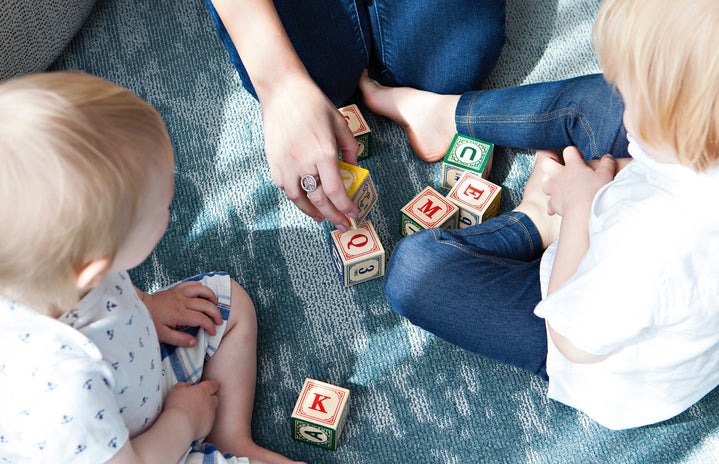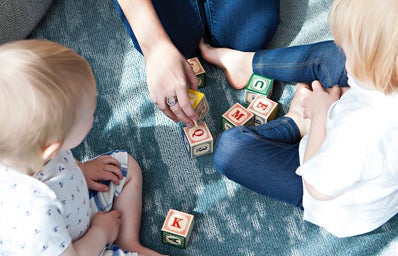As I turn right out of my building in the center of Stockholm, Sweden, the crisp fall air hits my face and the sounds of babies and little kids are everywhere. The only difference compared to home in the United States? All of the strollers are being pushed by men. Dads getting coffee while their newborns coo, dads getting groceries as their babies sleep in their brand new BabyBjorns, dads pushing their matching Bugaboo strollers with preschoolers in tow.
For as long as I can remember I have learned of the seemingly utopian approaches to gender in Scandinavia, specifically Sweden. Because of this, I am currently taking two Women, Gender, and Sexuality classes while studying abroad here, one of which is my “core course”, my main area of study. Being here now over a month, I have learned that this seemingly perfect egalitarian approach to gender, specifically parenting, is not as inclusive as it seems, and is aimed at a white, cisgender, heterosexual person or couple.
Sweden, along with the other Scandinavian countries boast of long, paid maternity leave for both parents. Of higher numbers of women in positions of power, in parliament. Of incredible free daycare for children so both parents are able to work. Sweden boasts of their progress in closing the wage gap, where the gap still exists but the margin is eight points smaller than in the United States. A new sexual consent law which claims that “sex without explicit consent is rape, even when there has been no violence or threats” (sweden.se) encouraging sexual assault to be reported in hopes of decreasing sexual violence. Furthermore, Sweden is the only country in the world to state they have a feminist government. On their government homepage it reads “Sweden has the first feminist government in the world. This means that gender equality is central to the Government’s priorities – in decision-making and resource allocation.” (Swedish Government)
Yet, there is still inequality here in Sweden. According to an article by Irin Carmon, for TIME magazine, after birth in a heternormative relationship, the father’s workload increases by 12 hours a week whereas the mother’s increases by 22. Although the new consent law was passed in 2018 which encourages survivors to come forward, the sexual assault statistics here are staggering. There are gendered assumptions here as well, for example, a woman would take at least 75% of her 480 days of parental leave. Maybe the father in this heteronormative relationship would take a few months.
All of this to say, all of this equality is incredibly binary and exclusionary. Non-binary and intersex people here in Sweden were not included in any of the mainstream gender inclusion movements until incredibly recently. The term “non-binary”, as well as using they/them pronouns, was not accepted in Sweden until the past few years. In Sweden, everyone has a personal number and the final digit indicates gender, everyone must have it. Even numbers are female, and odd numbers are male. Iceland was the first country to create a non-binary number, substituted with an “x”. This still has problems in and of itself though, as if being non-binary constitues an “otherness”, it does not. Throughout some of the Nordic countries, forced sterilization is still required for transgender folks. You cannot be a non-binary parent in Sweden. LGBTQIA+ couples in Sweden are protected under discrimination laws, however there is very little public display of affection of non-heterosexual couples as compared to the PDA and constant heterosexual couples who flood the city. So, in the Feminist Welfare state of Sweden, there is stil gender inequality and ignorance for people who do not fit the white cis gender binary system of welfare. In Fruit of Knowledge: The Vulva Vs. the Patriarchy Liv Strömquist writes about how so much of the history of gender inequality and stigma that surrounds queerness and not fitting the binary comes from fear and insecurity. Although we can look at these fears, of women menstruating, of polyamorous relationships, of people claiming unsuspected power, as ancient and antiquated there is still something to that both in the United States and in Sweden. These fears manifest into gender roles. They create societal boundaries for the way that folks are expected to behave, the jobs they are expected to work and the roles they are anticipated to take on. These fears turn into reproductive laws which have little to do with women’s bodies. Education around menstruation, abortion and sex in Sweden has lead to immense gender equalty around reproduciton and incredibly progressive reproductive laws and rights. I am interested to see this progress in the rest of my time here. I wonder if the United States will make progress like Sweden, but I am not sure if Sweden’s approach is necessarily the right way to do so.


